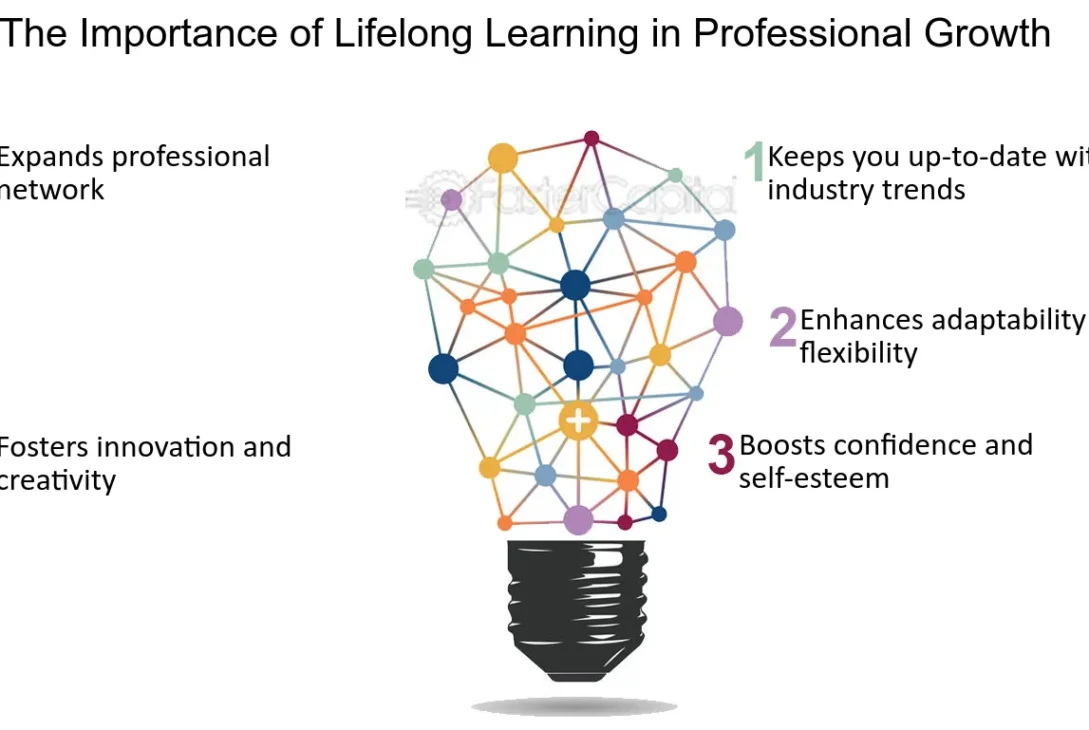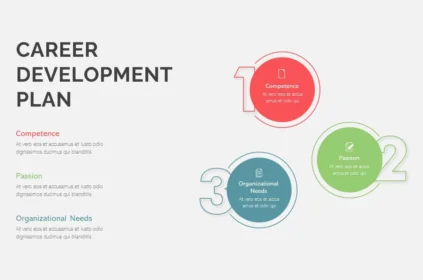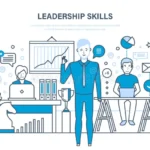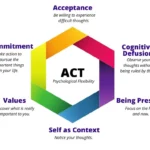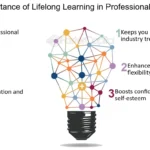In recent times’s fast-paced activity market, the career growth boom on non-stop mastering. The speedy evolution of generation, converting organization requirements, and Career growth competition require specialists to continuously increase their understanding and capabilities.
Without a dedication to lifelong studying, career stagnation will become a real danger, as specialists can speed up the return of folks who have a non-stop mindset of gaining knowledge.
By integrating mastering into everyday life, individuals live applicable, adaptable, and organized to capture new opportunities that strengthen professional advancement.
This article explores the significance of non-stop getting-to-know for career Growth, delveloping into its advantages, and providing actionable steps for incorporating getting-to-know into one’s expert adventure.
Table of Contents
| Section | Subsections |
|---|---|
| 1. Introduction | Importance of Continuous Learning for Career Growth |
| 2. Why Continuous Learning is Important | – Adapting to Technological Advancements – Enhancing Job Performance for Career Growth – Unlocking Career Advancement Opportunities – Building a Network for Career Growth |
| 3. How to Implement Continuous Learning for Career Growth | – Setting Clear Learning Goals – Leveraging Online Learning Platforms – Attending Industry Conferences and Workshops – Seeking Mentorship and Coaching – Reading Industry-Related Books and Articles – Joining Webinars and Online Communities |
| 4. Measuring the Impact of Continuous Learning | – Tracking Skill Acquisition – Assessing Job Performance Improvements – Monitoring Career Advancement Progress – Gathering Peer and Supervisor Feedback |
| 5. Overcoming Obstacles to Continuous Learning | – Prioritizing Learning in Busy Schedules – Budgeting for Education – Staying Motivated and Setting Milestones |
| 6. Conclusion | Embracing Continuous Learning for a Fulfilling Career |
| 7. FAQs | – What are the benefits of continuous learning for career growth? – How can I measure the impact of my learning efforts? – What strategies help overcome obstacles to continuous learning? – How does continuous learning enhance job performance? – Why is networking important in the learning process? |
Why Continuous Learning is Important
Adapting to Technological Advancements
One of the most critical motives for non-forestall reading is the need to keep up with technological modifications.
With innovations emerging swiftly all through sectors, from synthetic intelligence and device reading to cloud computing. The capacity to have a look at and adapt to new technology is crucial.
Professionals who prioritize studying can stay in advance of business enterprise tendencies, getting to know the tools and software program applications that redefine how businesses function.
Enhancing Job Performance for Career Growth
Continuous studying right now affects the process’s overall performance, making experts greater in a role and inexperienced in their roles.
As workers advantage of new competencies or insights. They may be capable of carrying out duties more efficiently, treating troubles creatively, and contributing to their groups. Improved overall performance can bring about recognition, new duties, or even promotions, putting the degree for a long-term career boom.
Unlocking Career Advancement Opportunities
A strong commitment to getting to know is a sign of private and professional willpower. In aggressive industries, employers search for people who invest in themselves through upskilling and certifications.
Professionals who actively pursue knowledge are better positioned for promotions and new roles, as they invent a properly- rounded and modern-day-day skills set to the table.
Building a Network for Career Growth
Continuous gaining knowledge moreover fosters treasured networking opportunities. Whether attending industry conferences, taking part in workshops, or challenging online publications, studying regularly involves interacting with others in the discipline.
Networking lets professionals shape relationships with pals, mentors, and industry professionals, especially for collaboration, mentorship, and probably new professional paths.
How to Learn Continuously and Effectively for Career Growth
Set Clear Learning Goals
Setting clear, achievable goals is the first step to really benefiting from continuous learning. Identify what skills and knowledge you need to move up the corporate ladder and formulate a learning plan to fill those gaps. Well-defined goals keep you focused and motivated whether you are building mastery in some software or working toward a new certification.
Leverage Online Learning Platforms
The advent of e-learning platforms has really changed the way professionals can receive education. In today’s time, sites like Coursera, Udemy, and LinkedIn Learning make it possible for learners to take courses in almost all subjects and industries. These platforms offer flexibility in learning at your own time and pace. Many courses are also certified, enhancing your resume and further testifying to the fact that you are a lifelong learner.
Industry Conferences and Workshops for Career Growth
Industry conferences and workshops are excellent opportunities for experiential learning and networking. Keynote speeches, panel discussions, and interactive sessions form the major part of such conferences, which bring to the fore the latest trends and developments of the industry. Attendance at these activities brings new perspectives and allows one to interact personally with experts in their fields while keeping up to date with innovations.
Seeking Mentorship and Coaching for Career Growth
Mentorship and coaching are strong career development tools. A mentor or a coach will give you personal guidance, share their experience, and help you along in your career. It is critical to interact often with the mentor or coach as this will result in useful feedback and pinpoint any areas where improvement is necessary for continuous learning. Find mentors within your organization but also seek out industry professionals that have experience in your area of interest.
Books and articles related to your industry
Another good way to keep up to date and learn is by following the industry-related books, journals, and articles. Thought leadership pieces or even case studies can offer new insights and viewpoints on the challenges an industry faces and their various solutions. Keeping track of relevant publications or following industry-relevant blogs will update you about the latest trends and developments.
Attend Webinars and Online Communities for Career Growth
Webinars and online communities can provide interactive learning experiences and engagement with industry peers. Webinars give you the chance to hear from experts as they present live and to ask questions on a particular topic.
Online communities and forums, like those on LinkedIn or other industry-specific platforms, allow for discussing, sharing knowledge, and networking.
Measuring the Impact of Continuous Learning
Some metrics that would illustrate whether your continuous learning efforts are really working include:
Skill Acquisition for Career Growth:
Check if you have obtained new skills or knowledge related to your job or career objectives.
Job Performance & Career Growth:
Observe whether your job performance or efficiency in operations has improved due to your learning activities.
Career Growth Advancement:
Note any progress regarding career advancement, promotion, taking up new roles, or additional responsibilities.
Peer and Supervisor Feedback:
Seek feedback from colleagues and supervisors about the effects of your learning on work and contributions.
Overcoming Obstacles to Continuous Learning
As desirable as continuous learning is, it is not an easy task. The most common obstacles revolve around time, cost, and staying motivated. To keep such obstacles at a distance.
Make Learning a Priority :
Learn to make time for learning in your day-to-day or week-to-week schedule so that it is not pushed to the backburner as other areas of life become action-packed.
Budget for Education: Save some for learning; embrace the free or cheap ones as much as possible.
Stay Inspired: Set small goals or milestones that can help you celebrate small achievements along your journey.
Conclusion
Acceptance and Commitment Therapy (ACT) is a groundbreaking healing method designed to assist people live meaningful lives with the aid of promoting acceptance, mindfulness, and values-driven action.
By shifting the focus from trying to remove terrible thoughts or emotions to embracing them as part of the human experience, ACT empowers human beings to make existence selections based on what matters to them.
Through techniques including cognitive defusion, mindfulness, and dedicated action . ACT helps foster higher intellectual health, stepped-forward relationships, and more resilience to life’s challenges.
These techniques help cultivate deeper information about one’s values, supplying a pathway to an existence that aligns with non-public ideals and desires.
ACT isn’t only a therapy but a practical tool that can be incorporated into normal life, from coping with pressure at work to constructing stronger relationships.
With its consciousness of mental flexibility, ACT encourages personal growth and self-compassion, supporting individuals to transform struggles into possibilities for improvement and perception.
Whether a person is managing anxiety, melancholy, stress, or trying to live a more fulfilled life, ACT offers an adaptable, studies-supported framework for meaningful change.
FAQs
1 What is the primary aim of Acceptance and Commitment Therapy (ACT)?
The core intention of ACT is to assist individuals to create a significant existence by accepting thoughts and feelings without judgment and taking action aligned with their core values. Rather than looking to manage or do away with terrible stories, ACT encourages embracing them as a natural part of existence.
2. Can ACT be blended with other healing approaches?
Yes, ACT can supplement different healing processes, which include Cognitive Behavioral Therapy (CBT) or Dialectical Behavior Therapy (DBT). The concepts of ACT are particularly adaptable, specializing in mental flexibility, which may beautify the effectiveness of various interventions.
3. Is there scientific evidence assisting the effectiveness of ACT?
Numerous studies validate ACT’s effectiveness in treating a variety of mental health problems, including anxiety, depression, chronic pain, and substance use issues. Research shows that ACT improves psychological well-being and resilience by way of self-awareness and mindfulness.
4. How long does it take to see the effects of ACT? The time frame for experiencing fine effects with ACT varies via person and relies upon factors including non-public commitment, frequency of exercise, and the severity of the demands being addressed. Many humans observe improvements within a few weeks of consistent practice.
5.Who can benefit from Acceptance and Commitment Therapy?
ACT is beneficial for a wide range of people, including those struggling with mental health situations like anxiety, depression, and chronic pain, as well as people seeking non-public improvement, advanced resilience, and a more significant, values-driven lifestyle.


